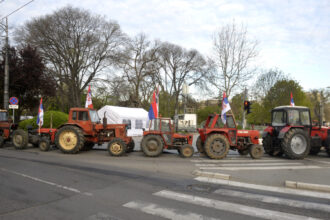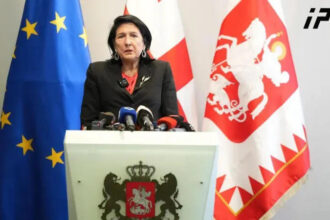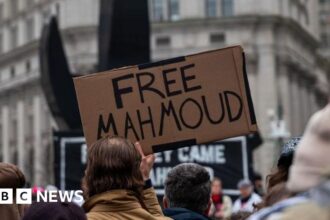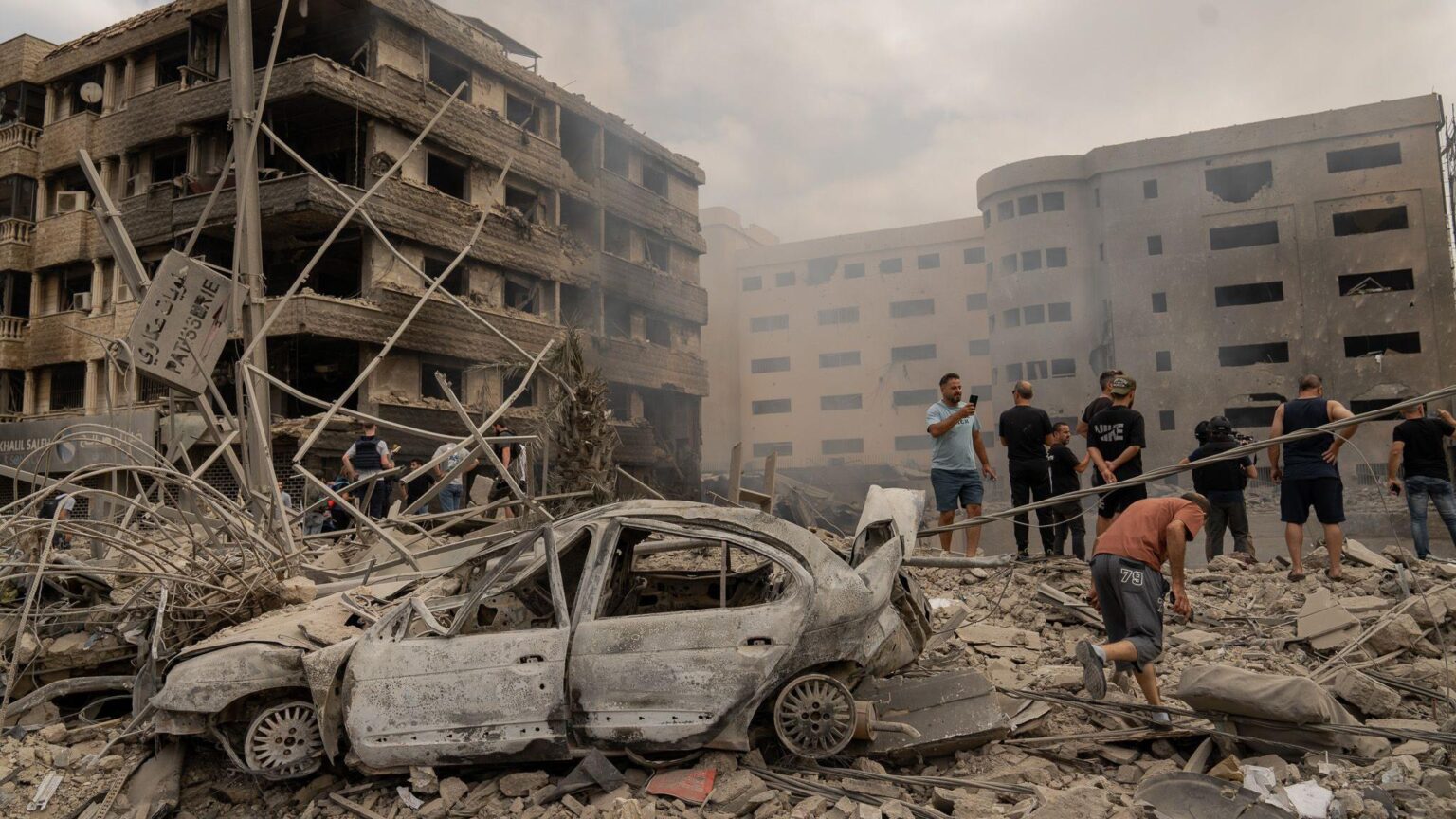A large gynecology clinic was damaged by an air strike that destroyed a building on the edge of Dahieh.
The air strike that killed Hezbollah leader Hassan Nasrallah caused the earth to shake for hundreds of meters in all directions.
Mehdi Mossawi, a resident of the Dahieh suburb in Beirut, thought that his own building was crumbling.
The 45-year old taxi driver and his Zahraa, who asked to have their names changed for this article, watched from his balcony as a thick layer of dust and smoke enveloped everything around. In the distance they could hear debris falling and heard the familiar buzzing of an Israeli drone.
In the past few days, drones were so common in Dahieh that people barely noticed them. Dahieh, a majority Shia suburb south of Beirut was once again under Israel’s watchful eye. Its more than 500,000 residents were again at risk of death.
“The missiles fall from the sky,” Mehdi said as he pointed to the arc of the projectile that fell to the earth. “And suddenly, everything you own is gone.”
He was sitting in a dirty, sun-baked patch on the edge Martyrs’ Square, central Beirut. The couple and their teenage sons now live there. Around them, hundreds of people in similar situations, many of whom were from Dahieh. The suburb was the hardest hit by the recent Israeli bombings of Beirut. It has seen a mass exodus from its population.
The aftermath of a strike that killed Hezbollah’s leader Hassan Nasrallah and destroyed four residential buildings.
Dahieh falls largely under Hezbollah’s control, the Iran-backed paramilitary and political group that is a strong force in Lebanon.
Hezbollah denied requests from the BBC to enter the suburb to see the damage caused by bombs. However, a BBC analysis based on video footage, Israeli warnings of evacuation and recent satellite images shows that at least 65 airstrikes have destroyed or severely damaged buildings. Some of these strikes included dozens of bombs and many of them destroyed or severely damaged multiple adjacent buildings.
Mehdi’s and Zahraa’s apartment was next to the Israeli strike. Zahraa cried when she saw the footage of their blackened, mangled building. “Look at us,” pleaded she. “Our home has disappeared.” “We have nothing, no hygiene, no washing machine.
Published on 6 October
Dahieh, in Lebanon, is often referred to as a Hezbollah bastion. The term does reflect the entire suburb, which is a densely populated residential area where Hezbollah is not the only political party. Above ground, the group is woven into the social and political fabric of the suburb, and provides services such as welfare and education. It has bunkers and underground tunnels where it can operate.
IDF says it has targeted Dahieh to assassinate Hezbollah’s leaders and that the group stores weapons in its bunkers among civilians. It claims to be targeting Hezbollah to return 60,000 Israeli citizens safely to the north, which has been under rocket fire by Lebanon for the past year.
Someone who filmed the aftermath of the strike captured the damage to Mehdi’s and Zahraa’s apartment.
Dahieh, unlike other parts of Beirut doesn’t have a name as such. The word simply means “suburb”. It is one the most densely-populated residential areas of Lebanon, with narrow streets and alleyways where buildings seem jostle to get space. It was heavily bombarded during the previous war in 2006 and still bears the scars.
“Dahieh used to be a beautiful place, but all the wars took their toll,” said Rasha Al-Ameer. She was born and raised there and still lives in the suburb. Her brother, who was a prominent critic against Hezbollah in Lebanon, was assassinated there in 2021.
“It’s still a vibrant and diverse place.” She said that there is a cultural institution and a lot political activity in the area. “It would be terrible if Dahieh were destroyed. The bombing has already destroyed much.”
Israeli air strikes have also destroyed or damaged businesses, restaurants, clinics, and shops. “Destruction upon destruction,” said Mohaned Khalaf a 45-year old Sunni Muslim baker, of his street, in Burj El Brajneh. This is the most heavily-targeted part of the suburb.
After an air strike, a damaged vehicle lies in the rubble of a Dahieh area Chiyah after an airstrike
Khalaf has been a refugee from Syria before and has returned to Dahieh to check on his apartment, which he shares with two of his brothers and their mother. He checks to see if any of his furniture is still there. “The buildings surrounding ours have been completely destroyed,” he said. “There is no one left, not a single person to be seen.”
The destruction has tested the patience of some Dahieh locals with Hezbollah, especially Sunnis and non-Shias. Khalaf’s mom, Sameera, wept in the street. “This war hurts everyone,” she said. “I am 63,” she said. “I want to wash in a place that is clean.”
Even after the war, Sameera doesn’t want to return to Dahieh. She said, “Yes, it is possible to rebuild, but Hezbollah will continue to fight Israel in this war.” “And Dahieh is going to suffer again.”
Shia Muslims – Hezbollah’s natural base of support – were more supportive, even to those whose lives were completely upended by conflict. Hezbollah members gave out $100 bills and food to displaced Shias on the streets of central Beirut. They also helped with shelter.
“We used to be Hezbollah supporters and we are still Hezbollah supporters,” said Gharib Ali a 61 year old janitor, who fled his suburb. Around him, his family nodded their heads in agreement. He said that the war’s impact on their lives had “nothing to do with the Shia community.” “If anything, this only increases our support.” “Every Shia feels the exact same.”
Signs at the entrance of part of Dahieh warn that it is dangerous to enter the area or take photos without permission from Hezbollah
Mehdi & Zahraa are an outlier in this regard – a Lebanese couple of Shias who have lived in Dahieh, Lebanon, for decades and were critical of Hezbollah’s role in the conflict.
Zahraa screamed angrily, “Dahieh was not Hezbollah. We were not Hezbollah. Our building was not Hezbollah.” “We went to bed one night and woke in someone else’s battle.”
The apartment of the family is no longer habitable, but the building could be salvaged. The Israeli army sometimes issues social media warnings before air strikes. However, there was no such warning for the strike on Mehdi’s and Zahraa’s building. The eldest son of the couple had gone home to shower that day, taking advantage a quiet moment. He was knocked down and cut by flying shards of glass when the bomb struck.
International humanitarian law requires a warning to be given in advance of any strike that may affect civilians. The BBC has found evidence that Israel has repeatedly struck Dahieh, and other parts in Beirut without warning. Where there were warnings they have been sent up to 30 minutes in advance, sometimes even at night.
“This timeframe is not a good advance warning to someone who lives in Dahieh,” Ramzi Keiss said, a Lebanon researcher for Human Rights Watch. “These people are sleeping in their beds. They are not on social media.”
Keiss also said that Hezbollah may have violated international humanitarian law by placing its military leaders in and around civilians. “But that doesn’t give you a pass to bomb as heavy as you can,” Keiss said, referring specifically to Israel.
“When you use 2000lbs in densely-populated areas, you put civilians at risk of serious harm.”
Lebanese officials estimate more than 2,400 people were killed and more than 1,2 million displaced in Lebanon over the last year. Israel claims 59 people were killed in northern Israel, including the Golan Heights occupied by Israel, during the same time period.
After a strike, a cloud of smoke rises above Dahieh. Israel has bombed Dahieh at least 54 times in the last few weeks
In the 2006 war, after Israel had heavily bombed Lebanon’s civilian infrastructure and pounded Dahieh, a senior IDF general, Lieutenant General Gadi Eidkot, sketched what would later be known as the “Dahieh Doctrine”. It called for the use of “disproportionate force” in civilian areas to pressure the people of Lebanon into turning against Hezbollah.
Prof Amal Saad is a lecturer and expert on Hezbollah at Cardiff University. She said that the recent escalation of Israel went “beyond Dahieh Doctrine”. “This is more similar to Gaza doctrine which is similar but has the aim of specifically targeting and dislodging a community.”
She said that Israel’s current actions in Dahieh are “somewhere between their Dahieh doctrine and Gaza doctrine”.
Prof Saad stated that the destruction would not lead to a reduction of support for Hezbollah at places like Dahieh as Benjamin Netanyahu, Israeli Prime Minister, has publicly expressed his hope for.
She said, “Whenever Israel invades in this way, it only increases the support for Hezbollah from Shias.” “After 2006, support skyrocketed. “I don’t think it can go any higher than 90% but this will solidify the support.”
After an Israeli strike in the suburb, the rubble is covered with a picture of a Hezbollah member.
After two weeks of bombing Dahieh, the US government pressed Israel to stop the air strikes. The US government said that it had told Israel it was unhappy about the “scope and the nature” of the Beirut airstrikes.
Then another day went by without any strikes. After three days residents returned to their apartments on Monday and Tuesday. Mehdi was one of them. He took his son’s scooter, and went back to the area around the building to get clothes for his boys.
Israel then began bombing Dahieh early Wednesday morning.
Mehdi said, “We knew that it was only a question of time.” He was sitting on the street with Zahraa, the boys and their makeshift tent – which was actually just two rugs draped over an improvised framework – a few hours following the return of the strikes.
Overhead, a brand-new, upscale apartment building was completely empty. Zahraa confirmed that it had a name similar to their apartment building. “For the price of one of these apartment, you could buy a whole neighbourhood in Dahieh,” said Zahraa.
She said they would rebuild. She raised her arms to show the strength of people from Dahieh. Mehdi said, “We have no other choice.” “Some people can choose, but we don’t.”
He said that they would return as soon as the ceasefire announcement was made. He knew there would be no electricity, no water and no windows on the buildings. It was still better than being out on the streets. Overhead, a buzzing Israeli drone buzzed. Mehdi looked at the empty apartments across from the tent, and then down at them. “God willing the ceasefire will arrive before the rain,” said he.
Joanna Mazjoub has contributed to this report. Paul Brown conducted research.
Read More @ www.bbc.com













